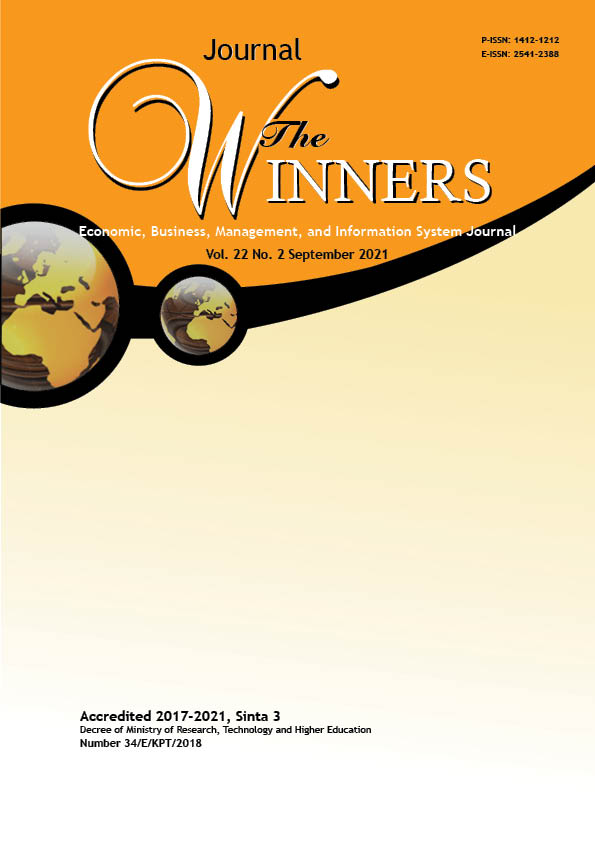Effect of Debt Default, Disclosure, and Financial Distress on the Receiving of Going Concern Audit Opinions
DOI:
https://doi.org/10.21512/tw.v22i2.7072Keywords:
debt default, disclosure, financial distress, going concern audit opinionAbstract
The research aimed to investigate the impact of debt default, disclosure, and financial distress on the acknowledgment of going concern audit opinion in manufacturing companies. The research applied a quantitative type of data complimented with secondary data retrieved from the official website of Indonesia Stock Exchange. Data obtained from purposive sampling method with 108 samples, consisting of 36 manufacturing companies listed on the Indonesia Stock Exchange in 2016-2018. The research used a logistic regression as data analysis method with several statistical tests which included descriptive statistics, multicolinearity, fit test goodness, etc. The results show that only financial distress influences the acknowledgment of going concern audit opinion, while other independent variables such as debt default and disclosure do not affect the acceptance of going concern audit opinion. The research is limited since it only refers to the manufacturing industry sector. Therefore, it is suggested that future research expand the scope by obtaining more firms’ sample from industrial sectors and using other independent variables to achieve a more accurate results.
References
Achyarsyah, P. (2016). The analysis of the influence of financial distress, debt default, company size, and leverage ongoing concern opinion. International Journal of Applied Business and Economic Research, 14(10), 6767-6782. http://repository.unas.ac.id/id/eprint/62.
Altman, E. I. (1968). Financial ratios, discriminant analysis and the prediction of corporate bankruptcy. The Journal of Finance, 23(4), 589-609. https://doi.org/10.2307/2978933.
Chen, K. C. & Church, B. K. (1992). Default on debt obligation and the issuance of going-concern report. Auditing: A Journal of Practice and Theory, 11(2), 30-49.
DeFond, M. & Zhang, J. (2014). A review of archival auditing research. Journal of Accounting & Economics, 58(2), 275-326. https://doi.org/10.1016/j.jacceco.2014.09.002.
Dewi, D. A. N. S. & Latrini, M. Y. (2018). Pengaruh financial distress dan debt default pada opini audit going concern. E-Jurnal Akuntansi, 22(2), 1223-1252. https://doi.org/10.24843/EJA.2018.v22.i02.p15.
Harris, R. & Merianto, W. (2015). Pengaruh debt default, disclosure, opini audit tahun sebelumnya, ukuran perusahaan, dan opinion shopping terhadap penerimaan opini audit Going Concern, Diponegoro Journal of Accounting, 4(4), 298-308.
Jamaluddin, M. (2018). The effect of financial distress and disclosure on going concern opinion of the banking company listing in Indonesian Stock Exchange. International Journal of Scientific Research and Management, 6(1), 64-70. https://doi.org/10.18535/ijsrm/v6i1.em10.
Jensen, M. C and Meckling, W. H. (1976). Theory of the firm: Managerial behavior, agency costs and ownership structure. Journal of Financial Economics, 3(4), 305-360. https://doi.org/10.1016/0304-405X(76)90026-X.
Johnstone, K. M., Gramling, A. A., & Rittenberg, L. E. (2016). Auditing: A Risk-Based Approach to Conducting a Quality Audit (10th Ed.). Boston: Cengage Learning.
Listantri, F. & Mudjiyanti, R. (2016). Analisis pengaruh financial distress, ukuran perusahaan, solvabilitas, dan profitabilitas terhadap penerimaan opini audit going concern. Jurnal Manajemen Dan Bisnis Media Ekonomi, 16(1), 163-175.
Read, W. J. & Yezegel, A. (2018). Advances in Accounting Going-concern opinion decisions on bankrupt clients: Evidence of long-lasting auditor conservatism ? Advances in Accounting, 40, 20-26. https://doi.org/10.1016/j.adiac.2017.12.004.
Ritonga, F. & Putri, D. F. S. (2019). Debt default dan financial distress sebagai determinan penerimaan opini audit going concern. Jurnal Sains Manajemen & Akuntansi, 11(1), 1-32. https://doi.org/10.37151/jsma.v11i1.22.
Saputra, E. & Kustina, K. T. (2018). Analisis pengaruh financial distress, debt default, kualitas auditor, auditor client tenure, opinion shopping dan disclosure, terhadap penerimaan opini audit going concern pada perusahaan manufaktur yang terdaftar di Bursa Efek Indonesia. KRISNA: Kumpulan Riset Akuntansi, 10(1), 1-10. https://doi.org/10.22225/kr.10.1.%25y.51-62.
Standard on Auditing (SA) 570 (Revised), Going Concern. (2013). http://kb.icai.org/pdfs/PDFFile5b3b56f75d65b6.04883715.pdf
Sugiyono. (2019). Statistika untuk Penelitian. Bandung: Alfabeta.
Verdiana, K. A. & Utama, I. M. K. (2013). Pengaruh reputasi auditor, disclosure, audit client tenure pada kemungkinan pengungkapan opini audit going concern. E-Jurnal Akuntansi, 5(3), 530-543.
Yaqin, M. A. & Sari, M. M. R. (2015). Pengaruh faktor keuangan dan non keuangan pada opini audit going concern. E-Jurnal Akuntansi, 11(2), 500-514.
Downloads
Published
How to Cite
Issue
Section
License
Copyright (c) 2021 Ari Marpaung, Indriani Puspita Sari (2), Bambang Leo Handoko

This work is licensed under a Creative Commons Attribution-ShareAlike 4.0 International License.
Authors who publish with this journal agree to the following terms:
a. Authors retain copyright and grant the journal right of first publication with the work simultaneously licensed under a Creative Commons Attribution License - Share Alike that allows others to share the work with an acknowledgment of the work's authorship and initial publication in this journal.
b. Authors are able to enter into separate, additional contractual arrangements for the non-exclusive distribution of the journal's published version of the work (e.g., post it to an institutional repository or publish it in a book), with an acknowledgment of its initial publication in this journal.
c. Authors are permitted and encouraged to post their work online (e.g., in institutional repositories or on their website) prior to and during the submission process, as it can lead to productive exchanges, as well as earlier and greater citation of published work.
USER RIGHTS
All articles published Open Access will be immediately and permanently free for everyone to read and download. We are continuously working with our author communities to select the best choice of license options, currently being defined for this journal as follows: Creative Commons Attribution-Share Alike (CC BY-SA)





















